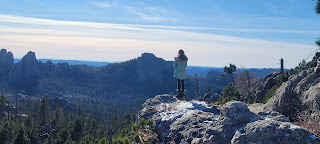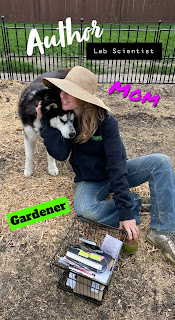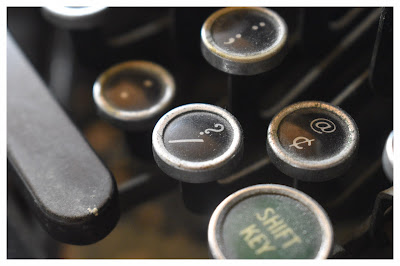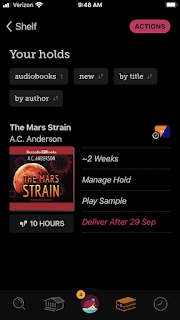A brief pause on the blog topic to officially share with you the audiobook cover for THE MARS STRAIN which will
release next Tuesday, April 27th!!!
Back to the topic at hand. It appears most writers fall into the INTJ category in the Myers-Briggs personality typing system, including our own Jeffe. Introverts prefer spending time in their own heads, which can lead to writing.
In the 1920’s Jung separated people into introverts and extraverts and he also split the cognitive process into two types, perception (sensation and intuition) and judgment (thinking and feeling), making eight different categories. The key here is no one will be fully in one category all the time, but you will default to your primary type.
I’m very curious—what type are you? And are you a writer?
No matter the phase of life or how many times I take the personality quiz I end up as ISFJ-Assertive. The assertive part comes as no surprise, especially to those who know me, because I am confident in my abilities and decisions. I loved managing a laboratory and cancer clinic. And that career path makes so much sense because my personality type is Defender in the Sentinel category.
Sentinels view productivity as a superpower and plan for everything. We seek order, stability, and security and are comfortable with who we are. Sentinels prefer to work on one project until completion, no hopping from thing to thing for us. And we find inspiration from the past rather than the future.
If you’re curious about the four types of personalities, or want to take a Myers-Briggs quiz for yourself,
16Personalities is a fun website to check out.
Why are we talking about this on our blog this week? Well, understanding yourself and how your brain works is a fantastic tool. I won’t tack on for writing because knowing how you work best will benefit you in everything. But alright, I’ll narrow this down to crafting books and how perception and judging impact the act.
For me, my perception is Introverted Sensing (Si) and when I’m drafting a new book I’m looking back to what I’ve experienced before and drawing on those reactions and feelings for my characters. I work on gathering information—the time suck known as researching.
If you’re like most writers, Introverted iNtuiting (Ni), you’re more likely to find your thrill in the conceptualization—dreaming up your characters and world building—and have a hard time moving on from that stage.
If you know where your strengths are, then you know where your weaknesses are. Don’t get trapped in your own mind! Example, if you’re stuck in the researching/conceptualization phase how do you move onto the Extraverted Thinking phase where your story becomes organized (yes, necessary even if you’re not a plotter) and forms a beginning, middle, and end.
For all of us introverts trying to write, what can we do? Don’t get trapped in your own mind. Yes, easy to type out, difficult to actually do and so here are some suggestions that I’m working on:
How to work those Extroverted Thinking muscles
1: Allow yourself time in your strength. My favorite part of the writing process is outlining and researching and I have my best writing days when I start my time reviewing my detailed outline or deep chapter outlines before diving into the actually act of pulling words from the air.
DANGER: I can’t let myself spend all day there, or my word count will be a big fat zero.
Go ahead and let yourself swim in your comfortable waters to warm up for the day, then dive into whatever deeper pool you’re aiming for.
2: Swallow that fear. I expect you’ve had days like me where you can’t believe you’re trying to write and everything is garbage. The reality, and I can’t thank my CPs (critique partners—particularly Charissa Weaks who has been a god send) enough, is that my writing works, but I’m afraid to put it out there. Even when I’m not close to sending something out or having a book release my mind knows that the end game of all that typing is people reading my words.
You can let the fear rule the day, or you can face it and tell yourself it’s worth the risk. Of course nothing’s ever obsolete, and there are times fear is really your gut telling you something’s wrong with the story.
3: Set Goals. Hopefully this is an easy one, but here’s a twist to it—make one accessible goal for each day. Finish the book is an excellent goal, but daunting when that’s what’s staring you in the face each morning and you’re on chapter 2.
Break it down. Yes this is structure, but even abstract thinkers need some structure in order to put together a story, otherwise people won’t understand it.
4: Trust your gut to guide you. I’ve got that F in my personality type and I know I rely on feeling, but I’m also a laboratorian and trained myself to view with an analytical eye. So I have experienced conflicts trusting my gut when I’m stuck wearing my lab coat. Some instances scream for me to take off the jacket and let the wind guide me.
When writing THE MARS STRAIN I knew the timeline of both my story and the infection process, it was science. But I was stuck in the middle of the book, I knew it wasn’t working, but I forced myself to keep writing to the timeline. Once I let go and followed my gut I backed up and rewrote a few chapters with more of a character focus. Le voilà!
5: After your gut has you on the right track, time for Extroverted Thinking (Te). Break down the problem. Don’t try to tackle everything at once or you’ll overload your brain. The Te phase is the big red button, the ignitor. Once you hit it everything’s a go and you leave behind the feeling, sensing, and intuiting. I wasn’t able to look at my entire manuscript and see all the twists and tweaks that needed to be done. I started with my main character and worked from there.
If you’re a storyteller you like living in your own head and no matter what cognitive functions you excel at, I hope some of this helps you defeat procrastination.




























